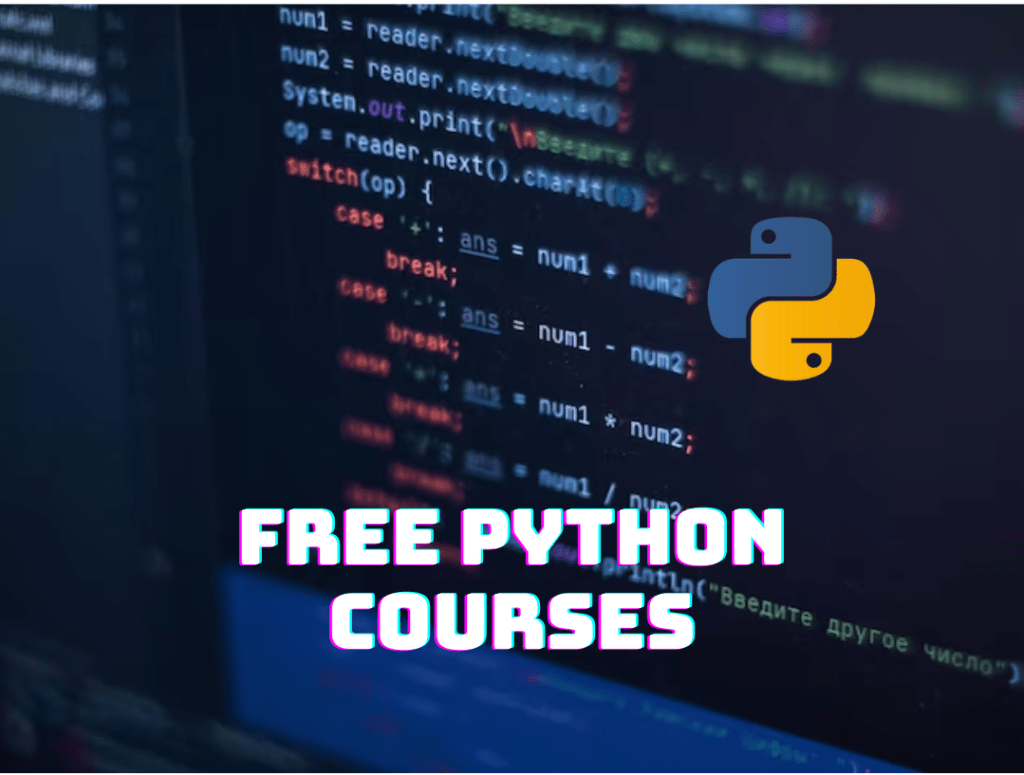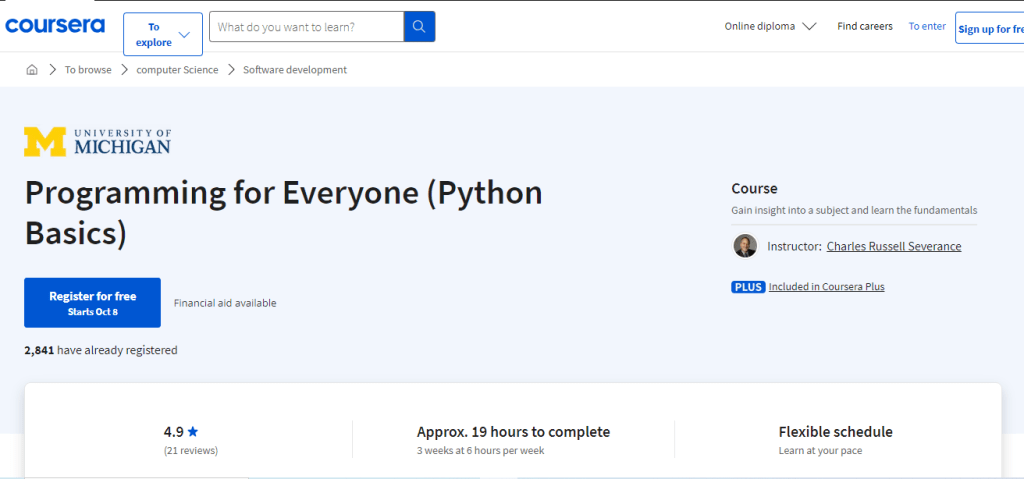
Are you interested in learning the Python programming language? Well, you’re in luck! There are many free Python courses available online that can help you get started with this powerful and versatile language. In this article, we’ll take a look at some free Python courses out there so you can choose the one that suits your needs and learning style.
Whether you’re a beginner or an experienced programmer looking to expand your skills, Python is a great language to learn. It is widely used in web development, data analysis , artificial intelligence and many other areas. Additionally, it has a large and active community that creates and shares a wide variety of resources, including free courses.
So, without further ado, let’s dive into the top free Python courses available online. We’ll cover a range of topics, from beginner introductions to more advanced subjects, so you can find the perfect course to suit your needs.
Table of Contents
Free Courses to Learn from Scratch
Here are some free Python courses for beginners:
Python for Beginners

Python for Beginners – This course is offered by Microsoft Learn and is divided into 4 modules and covers the basic concepts of Python programming. Students learn to write their first Python programs, work with data and functions, use control flow structures . This way, the course is certified and upon completing the course, we can follow the learning path shown on the website.
Programming for Everyone (Python Basics)

Python for Everyone – This course is taught by the University of Michigan and is an introduction to programming in Python. Thus, students learn to write simple Python programs, work with data, and use control flow structures. The course is free, has 7 modules and lasts 4 weeks.
Python course at FIAP

Python Course – This course is an introduction to programming in Python and covers the basic concepts of the language. In this way, students learn about various types of manipulations , libraries and operating systems. The course is free, has a free certificate , a workload of 80 hours and a duration of 8 weeks.
Free Python courses to learn how to work with data

The Python language is widely used in data science due to its simplicity and many libraries, see the courses below:
Course : Getting Started with Python for Data Science
This course offered by Codecademy is a great option for beginners who want to learn Python specifically to work with data. In this way, covering fundamental Python concepts and how to apply them to data analysis. It’s an excellent choice if you’re just starting to program in Python.
Course :Analyze Traffic Safety Data Python Case Study
This is another Codecademy course that focuses on real-world case analysis related to road safety. You will have the opportunity to apply your Python skills to analyze real data and derive insights. So this can be a practical way to learn Python and how it is used in real-world data analysis.
Course of Python for Data Analysis

The Data Science Academy offers a variety of courses related to data science and data analysis. The “ Python Language Fundamentals for Data Analysis and Data Science ” course appears to be a solid choice for anyone looking to deepen their knowledge of Python in the context of data analysis. Thus, Data Science Academy is known for providing high-quality resources in data science.
Python articles on our website
In addition to the aforementioned free courses, we also offer a variety of articles about Python on our website. These articles cover a wide range of topics, from basic to advanced, and are written by software development experts. Here are some of our most popular Python articles:
- Introduction to Python: This article is a great choice for beginners starting from scratch in Python. Covers basic concepts such as variables, data types, loops, and functions.
- Handling and Manipulation: We contain some articles for string handling, adding or removing, ordering, checking the size of a string and much more.
- Libraries for Data Analysis: We have some articles talking about libraries like Pandas which is a popular data analysis library in Python. This article shows you how to use Pandas to read and manipulate data in a CSV file.
- Repetition structures in Python: This article contains the main repetition structures in Python, including for, if, if else and while. These structures are essential for creating recursive and iterative programs.
These are just some of our articles about Python. In this sense, we can find many others on our website, as well as tips and tricks to help you become a more skilled Python developer.
Overall, these free courses are a fantastic way to start learning Python for data analysis. However, remember that learning is an ongoing process, and you may need to supplement these courses with other resources such as books, online tutorials, and personal projects to develop your data analysis skills. Constant practice and practical application are essential to becoming a competent data science professional.
Strengths of free Python courses over paid courses
There are several strengths of free Python courses over paid courses. Here are some of them:
- Cost : The main strength of free Python courses is that they are free. This way, we can learn the programming language without having to spend money. In comparison, paid courses can be quite expensive, especially if we are looking for a high-quality course.
- Accessibility : Free Python courses are generally accessible from anywhere with internet access. This means we can learn at our own pace and from anywhere, making it ideal for those who have busy schedules or who live in rural areas.
- Flexibility : Free Python courses are often self-paced, meaning you can learn at your own pace and style. Therefore, this is useful for those who prefer to learn on their own or who have previous experience in programming.
- High-quality content: Many of the free Python courses offer high-quality content, with videos, practical classes, and exercises. Therefore, some of them are taught by experienced and renowned teachers, which means we can learn of high quality.
- Community: Many free Python courses offer a learning community where you can connect with other students and discuss problems, exercises, and projects. This can be motivating and help maintain interest in learning.
So, these are just some of the strengths of free Python courses. However, it’s important to remember that paid courses can also offer additional benefits, such as personalized support, access to exclusive resources, and certificates of completion. The important thing is to research and evaluate the available options to find what best meets your needs and learning objectives.
5 reasons to take free Python courses
Free Python courses can be a great option for developers who want to improve their Python skills and knowledge, from basic concepts to advanced technologies. So, here are some ways these courses can help developers:
- Learn Python Basics: Free Python courses can help developers learn the basic concepts of the language, such as variables, data types, control structures, functions, and modules. Thus, these concepts are fundamental for any software development project in Python.
- Developing programming skills: In addition to learning the basics of Python, free courses can help developers develop programming skills such as logical thinking, problem solving, and algorithm design. Therefore, these skills are essential for success in any programming language.
- Learning advanced technologies: Free Python courses can also help developers learn advanced technologies such as machine learning, artificial intelligence, web development, and databases. In this sense, these technologies are increasingly popular and used in software development projects.
- Practices and projects: Free Python courses can provide practices and projects for developers to apply their knowledge and skills to real projects. Thus, helping to solidify learning and develop application skills in real-world projects.
- Skills upgrade: Free Python courses can help developers upgrade their Python skills and knowledge, especially if they already have experience in other programming languages. This way, it can help them adapt to new technologies and development techniques.
